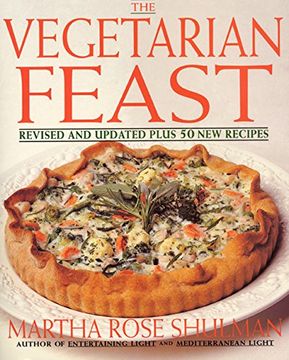Reseña del libro "The Vegetarian Feast: Revised and Updated (en Inglés)"
Foreword to the New Edition Not too long ago when I was teaching a Mediterranean cooking class in New York, one of the students asked me if I was planning to do an updated version of "The Vegetarian Feast." She had bought the book in 1979, and still cooked black bean enchiladas, one of its signature recipes, every time her son came home from college. But many of the recipes in the book contained more fat than she likes to use now. I too had become a lower-fat cook, dedicated to reducing fats in recipes without sacrificing flavor. Although I hadn't exactly relished fats back in the seventies, when I looked at my recipes in "The Vegetarian Feast," I could see that they needed an overhaul. And so I began this revision. It has been one of the most interesting undertakings of my career, enabling me to look at myself learning to cook. I feel fortunate to have had the opportunity; a novelist, after all, does not get to revise his or her first novel fifteen years down the line, even though he has matured and his style and outlook have probably changed. When I wrote this book in the mid-seventies, I was already committed to applying healthy principles to good cuisine. I did not become a vegetarian out of principle, but because it seemed the easiest way to combine healthy habits with delicious foods. I wanted, passionately, to create a tasty cuisine that did not include much in the way of processed or "adulterated" foods. "Nutrition" was a key word, and a relatively new idea back then. But our knowledge of nutrition was quite different at the time. The role that fats play in the diet was not as well understood as it is now. I knew that fat calories were the hardest calories to burn, but I still used more fat than I now know was necessary. Many tablespoons of butter and oil and cups of cheese, most of the nuts, and almost all of the cream (there wasn't much of that ingredient to begin with) have been discarded in this edition of "The Vegetarian Feast." In the seventies Americans were much more protein-fixated than we are now, so we vegetarians tended to compensate for the absence of meat by incorporating lots of high-fat cheese or nuts into our diet. I was very keen on proving that complete protein could be had at every meal, by combining grains, beans, and dairy products in the right proportions. Now nutritionists tell us that protein combining can be done as efficiently over the course of a day, so we have been able to simplify our menus. I also thought that by incorporating as much texture as I could into a dish I would compensate for the absence of meat; so my dishes tended to be busy, with nuts thrown in often, sometimes where they had no place to be. A self-taught cook, I took as my early mentors not so much other vegetarians as classical cooks. Julia Child was my main inspiration. As I reread the recipes in the original "Vegetarian Feast" I could see myself learning her techniques, then applying them to my dishes. For example, the soups I learned from Julia and other classical cooks were thickened with roux, the way sauces are, so many of mine were, too. Now I would never thicken a soup with a roux; I use potatoes in the new soups chapter, a much simpler and more efficient way to thicken a pur‚ ed soup. Over the last fifteen years my gastronomic horizons have widened enormously. How could they not? I lived and cooked in Paris for twelve years, and traveled widely in the Mediterranean and studied its cuisines. Living in France lightened my touch and refined my palate. My dishes became simpler, more to the point, and my tastes, as those of so many Americans, became decidedly Mediterranean (with an enduring love of Mexican food). You will find, in this new edition, that olive oil is the oil of choice. Fifteen years ago we had not really discovered it, and had certainly not created a demand for the fine imported virgin oils that are so readily available today. When I wrote "The Vegetarian Feast" I was exploring each and every cuisine. Any appealing dish that was vegetarian, or could be successfully converted, was a candidate for the book; consequently the book is quite eclectic. That aspect remains. But because my palate has matured, the flavors in the dishes themselves are more focused. I've also made some additions. There is a pasta chapter in this new edition. It's hard to believe that pasta was not such a big thing at the time I wrote this book. It would have been much easier to convince people that vegetarian eating could be easy and full of familiar flavors and ingredients if we had been as in love with this food then as we are now. Today I could write a whole book of vegetarian pasta recipes.

